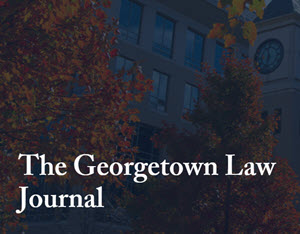Become a Patreon!
Abstract
Excerpted From: Georgetown University and The Georgetown Law Journal, Prosecutorial Discretion, 50 Georgetown Law Journal Annual Review of Criminal Procedure 269 (2021) ( 38 Footnotes) (Full Document)
 The government has broad discretion to initiate and conduct criminal prosecutions because of the separation of powers doctrine and because prosecutorial decisions are “particularly ill-suited to judicial review.” As long as there is probable cause to believe that the accused has committed an offense, the decision to prosecute is within the prosecutor's discretion. A prosecutor may also decide what charges to bring, when to bring them, and where to bring them. A prosecutor also has authority to decide whether to investigate possible criminal conduct, grant immunity, negotiate a plea bargain, or dismiss charges. Finally, when a defendant has provided substantial assistance to the government, a prosecutor has broad discretion to recommend a downward departure from the Sentencing Guidelines.
The government has broad discretion to initiate and conduct criminal prosecutions because of the separation of powers doctrine and because prosecutorial decisions are “particularly ill-suited to judicial review.” As long as there is probable cause to believe that the accused has committed an offense, the decision to prosecute is within the prosecutor's discretion. A prosecutor may also decide what charges to bring, when to bring them, and where to bring them. A prosecutor also has authority to decide whether to investigate possible criminal conduct, grant immunity, negotiate a plea bargain, or dismiss charges. Finally, when a defendant has provided substantial assistance to the government, a prosecutor has broad discretion to recommend a downward departure from the Sentencing Guidelines.
Although broad, prosecutorial discretion is not unlimited. Prosecutors may not engage in selective prosecution, which denies equal protection of the law, or vindictive prosecution, which violates due process rights. Claims of selective and vindictive prosecution arise from alleged retaliation for the exercise of protected rights. Selective prosecution claims typically assert that a defendant is only being prosecuted for exercising protected rights. Vindictive prosecution claims typically assert that the charges against a defendant were increased in number or severity in retaliation for the exercise of protected rights.
Selective Prosecution. Prosecutions deliberately based on a defendant's race, religion, or other arbitrary classifications, including a defendant's choice to exercise protected legal rights, can constitute equal protection violations. Selective prosecution claims are judged according to “ordinary equal protection standards,” meaning that a defendant must show both a discriminatory purpose and a discriminatory effect. Because courts presume that prosecutors comply with equal protection requirements, a defendant challenging an indictment on selective prosecution grounds bears a heavy burden to prove facts sufficient to satisfy the two requirements.
To minimize the impact of insubstantial claims, courts place “rigorous” standards on defendants seeking discovery in selective prosecution cases. Before being permitted to pursue discovery related to a selective prosecution claim, defendants must provide “some evidence tending to show the existence” of a discriminatory purpose and a discriminatory effect. Statistical studies can be used to demonstrate a discriminatory effect, but courts will frequently reject them if their samples do not provide information about similarly situated individuals. The discriminatory effect prong requires “a credible showing of different treatment of similarly situated persons.” A defendant generally waives their selective prosecution defense by not properly raising it before trial.
[. . .]
Vindictive Prosecution. The Due Process Clause prohibits a prosecutor from using criminal charges to penalize a defendant's valid exercise of constitutional or statutory rights. When a defendant successfully exercises legal rights during or after trial and at sentencing or upon reindictment faces an increase in the number or severity of charges, a presumption of vindictiveness may be created if “a reasonable likelihood of vindictiveness exists.” In Blackledge v. Perry, for instance, the Supreme Court held that the Due Process Clause was violated when a prosecutor brought a more serious charge against a defendant who had pursued a statutory right of appeal from a conviction on a lesser charge for the same offense. The presumption is justified on the grounds that it is difficult to ascertain prosecutors' motives, and that, in certain circumstances, due process can be implicated by the mere appearance of vindictiveness. A presumption is less likely to exist when additional charges are filed after a mistrial or an acquittal. Moreover, a presumption of vindictiveness ordinarily does not arise before trial. A presumption of vindictiveness is more likely to arise post-trial, but it can be rebutted by objective evidence that the prosecution was proper. Even where the presumption does not apply, a defendant can succeed by presenting objective evidence of actual vindictiveness.
Become a Patreon!


